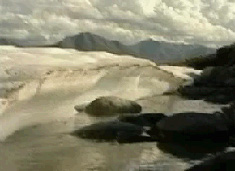 |
 |
 |
 |
 |
 |
 |
 |
 |
 |
 |
| Deep-sea fisheries |
| Genetic modification |
| Global warming |
| Miscellaneous topics |
| Native species control |
| Seabird protection |
 |

|
|
The comments presented are from interested people wishing to express their views,
pass on information, and participate in discussion on various environmental issues.
Their comments are not necessarily the opinion of TerraNature, and may not represent a
position TerraNature takes. |
|
 |
Global warming Related TerraNature Articles:  Recent warming of Arctic may
Recent warming of Arctic may affect worldwide climate  South American glaciers melting faster,
South American glaciers melting faster,changing sea level |
I am pleased to see that Meridian Energy had the sense to bail out of Project Aqua
before any more planning money was wasted. The 6,000 public submissions opposing water
allocation must have been a warning of the public opposition that was going to come in
the resource consent process. The next battle will be against big coal electricity
generation proponents who are seizing the opportunity of the downfall of hydro generation
to accelerate coal generation. It is now up to proponents of renewable energy to also
jump on the opportunity to promote the development of wind generation. It is quite an advertising campaign the Department for the Environment has launched to
get 4 million people to save energy. It will be wonderful even if the entire 4
million do not do their bit. Our country does need us to do our share, but we
need our government to do its share. We need the Ministry for the Environment to
halt the expansion of fossil fuel generating plants, and get on with developing renewable
energy generation. We need the Ministry of Transportation to enact emission controls
for automobiles. We need government to set a very big example, to inspire all
citizens to do their bit to save energy, knowing the big global warming gas emission
issues are being taken care of. I am pleased to be a careful owner by saving energy. I have been doing it for
quite awhile. I have gone to the extent of taking the light bulb out of my
refrigerator, never using a clothes dryer, and removing the waste disposal unit in my
kitchen sink. But I feel the government is passing burden onto its good citizens,
while not taking enough burden itself. The government's campaign will be more
effective if we are told what the government is doing to save energy. The Ministry for the Environment is calling for every citizen to help reduce the effect of climate change on New Zealand with its "4 million careful owners" campaign. The energy saving measures the Ministry is asking homeowners, farmers and workers to make have been practiced by environmentally concious people for some time. It is what every good citizen should do. However, the campaign lacks incentives for those who couldn't care less, and the Ministry's expectation that everyone will do it seems overly optimistic. Nevertheless, the campaign is an encouraging step, and welcome government recognition that climate change will adversely effect the nation's economy and the natural environment. Domestic energy savings will not alone satisfy New Zealand's carbon emissions reduction need. A much more far-reaching scheme is necessary that encompasses various forms of energy efficiency in industry, government, commerce, building construction, and homes; as well as generation from noncarbon sources, and distribution incentives. There are many ways government can cause reduction in the burning of carbon fuels. Taxing the sale of high energy consumption and luxury items (such as gas sucking vehicles), or eliminating or reducing taxation of fuel efficient items (fluorescent light bulbs, energy efficient appliances, alternative fuels vehicles) may persuade people who would not otherwise care. Energy use has been reduced in government facilities, but much more can be done to set an example to the public. But the best way to get the public behind reducing the emission of global warming gases, is to develop a government plan for a renewable and hydrogen fuel future for New Zealand, because it is hard to understand that enough is achieved by turning off lights and hanging out washing, when power is coming from a coal burning plant spewing thousands of tons of carbon into the atmosphere. Ginny Thomas, Auckland 6 January 2004 The aerial photos of the Arctic, Antarctic and Patagonia icefields are real eye
openers - very convincing evidence that the world's atmosphere and oceans are getting
hotter. The images leave me with the impression it has been happening faster than anyone
thought. So now that everyone must be convinced (even George Bush admits there is global
warming), we come to the hard part. Will science be convincing in defining the extent of
the threat, and what will be done to counteract it? Unfortunately the New Zealand
government is still thinking in the dark ages of coal, gas and hydro electricity generation.
Little is being done in New Zealand to develop renewable energy sources, and not
enough is being done to improve energy efficiency. New Zealand will meet its near
term energy needs entirely by adopting an aggressive energy efficiency programme. |
|
 |
 |
  |

 Return to have your say ... comments directory
Return to have your say ... comments directory
